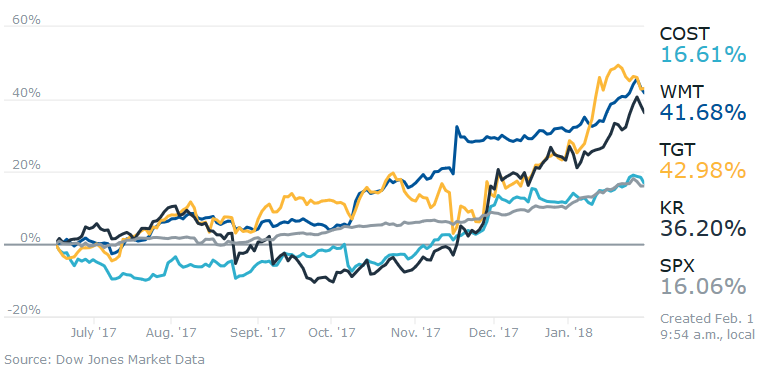by William Smead, Smead Capital Management
Warren Buffett, Jeff Bezos and Jamie Dimon recently announced that their three companies will form a non-profit entity to attempt to drive down healthcare costs for them and possibly other companies. In the process of making the announcement, Buffett called the healthcare sector of the U.S. a “hungry tapeworm” in the economy. We view this as PR grand standing, incorrect in its assumptions about healthcare costs, and the height of hypocrisy. It reminds us who might be the real tapeworms in the U.S. economy and could open some great doors to future appreciation.
Jeff Bezos has spent the last year creating future revenue fantasies by spooking entire industries as he created the largest net worth on paper in the world. Every time he does this, the target companies plummet and Amazon’s shares benefit. The healthcare sector is his latest punching bag, as reflected in these stocks getting trounced on January 30, 31, and February 2, 2018. Below is the chart of what happened in the aftermath of the retail and grocery bloodbath from Amazon’s Whole Foods acquisition last year:1

Scott Galloway, Professor of Business at NYU, points out correctly that these FAANG companies2 have more power than a free-market capitalist system can handle. Government on both sides of the political aisle have yet to recognize this, and those on the left side of the political spectrum love Bezos’, Dimon’s and Buffett’s moral and financial support. Buffett looks like he is “talking his book,” because he owns very little in the healthcare sector in common stock or entire companies. Ironically, this grandstanding isn’t likely to do much more to drive down costs any more than Obamacare or the other companies that have tried the same thing.
The worst part of this lambasting of healthcare is the many erroneous assumptions made by everyone involved. Pooling in Obamacare attempted to drive costs lower by forcing healthy young people to buy insurance. The folks who had to buy and the surcharge tax on high-income Americans subsidized many who gained insurance. Costs continued to soar anyway.
Why are costs soaring?
Cost are soaring for three main reasons in our view.
- 1. The forth commandment in the Bible says, “Honor your Mother and Father and you will have long life.” This has become true in the U.S. Life expectancy has grown more than six years during my lifetime. We are gracious to the elderly and most of what is spent on healthcare is spent the last ten years of our lives. Warren Buffett received prostate cancer treatment in 2012 at 81 years of age, as an example.
- 2. There is a growing number of Warren Buffetts. The baby-boomers are hitting 70 years of age by the thousands every day. The cost of healthcare explodes after 70. Consorting with Jeff Bezos’ 27-year-old software engineers and Jamie Dimon’s Gen X age bankers won’t have any impact on keeping the Warren Buffetts of this world alive. Willie Sutton robbed banks and the healthcare sector uses scientific brilliance to extend life because that is “where the money is!”
- 3. Chronic illness (heart disease, diabetes, cancer) passed acute illness (flu, pneumonia, malaria) years ago as the leading cause of death in America. Therefore, it is way less expensive to treat these chronic maladies with pharmaceutical and biotech remedies than constant hospital visits.
Buffett has become famously rich by owning high profit margin businesses which made products customers became addicted to, such as Coke, Dairy Queen and See’s candy. Refined sugar is a leading cause of healthcare expense in our society. How would Warren like it if someone at Merck or Amgen lobbied with Congress to shut down or socialize the beverage, fast food or candy business in the U.S.?
Bezos’ hypocrisy is shown in the way he has siphoned money in our society away from federally-taxed companies to his money-losing e-commerce business. In the twenty years it has existed, it has barely paid federal income taxes. This forced all other tax payers to shoulder the federal, state and local healthcare tax burden. This doesn’t surprise us. He brought tens of thousands of people to Seattle so that the rest of us would pay the preponderance of local taxes. He has starved Washington state of revenues, as it taxes business revenue done in the state only.
We love Buffett’s value investing discipline and his generous teaching, but Buffett is no slouch to federal tax avoidance. He pays himself a pittance salary, pays no shareholder dividends and has pledged to send his low cost-basis stock to the Gates Foundation, meaning his personal wealth creation machine has largely skipped federal and state taxation. Bezos and Buffett may actually be the “tapeworms” of the economy and not the healthcare industry.
Just like last summer, when bargains showed up in retail and grocery shares on the Amazon/Whole Foods spook session seen above, we see bargains in healthcare. We like Amgen (AMGN) and Walgreens (WBA) trading at deep discounts to the S&P 500 Index on a P/E basis. Most Wall Street analysts seem to be underestimating Amgen’s new drug, Repatha, which drastically reduces bad cholesterol. This has been a terrible flu season in the U.S. and Walgreens might be having their best winter ever. Bezos, Dimon and Buffett might be laying these bargains in our lap.
I worked under Jamie Dimon during my time at Smith Barney. I respect and admire him as a person and a business manager. His involvement in this consortium looks like hypocrisy wrapped in a stock price that has done very well and a legion of business people that love and adore him. I wouldn’t want to be the healthcare banker calling on the clients of the respective publicly-traded businesses that were just punished for seeking a profit in today’s healthcare system. Hopefully, Bezos, Buffett and Dimon have good intentions for being involved in this consortium. We hope they aren’t just adding pavement on the road to hell.
Warm regards,
William Smead
1Source: Barron’s
2FAANG companies include Facebook (FB), Amazon (AMZN), Apple (AAPL), Netflix (NFLX) and Google parent Alphabet (GOOGL).
The information contained in this missive represents Smead Capital Management’s opinions, and should not be construed as personalized or individualized investment advice and are subject to change. Past performance is no guarantee of future results. Bill Smead, CIO and CEO, wrote this article. It should not be assumed that investing in any securities mentioned above will or will not be profitable. Portfolio composition is subject to change at any time and references to specific securities, industries and sectors in this letter are not recommendations to purchase or sell any particular security. Current and future portfolio holdings are subject to risk. In preparing this document, SCM has relied upon and assumed, without independent verification, the accuracy and completeness of all information available from public sources. A list of all recommendations made by Smead Capital Management within the past twelve-month period is available upon request.
©2018 Smead Capital Management, Inc. All rights reserved.
This Missive and others are available at www.smeadcap.com.














